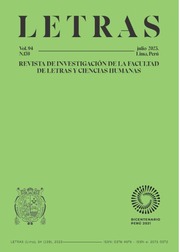African Ancestry. Rhythm and Orality in Toques de Son Colorá
Abstract
The following article analyzes the centrality that rhythm acquires in the novel Toques de Son Colorá (2020) by the Colombian writer Adelaida Fernández Ochoa. The objective is to demonstrate that the relevance of this component arises linked to the oral tradition, which in turn is linked to the ancestral African roots present both in the biography of the author and throughout the American continent, so they permeate the entire narrative. Specifically, the relevance of the musical genre of salsa along with other Caribbean rhythms within the plot of the novel will be addressed as examples of the presence of that ancestral heritage in the contemporary context of the work. At the same time, this analysis will be guided mainly by the studies on this component developed by the Peruvian researcher Victoria Santa Cruz Gamarra, together with various Afro-centered theoretical proposals that address the concept of orality. We see that in this work this component arises twinned with that of writing, allowing with this to expand the investigations already carried out on Afrodescendants and their role in both Colombian and Latin American identity, considering the approaches obtained from the intersection between gender and race present in the novel.Downloads
Métricas alternativas
References
Álvarez A. y su Son. (2010). ¿Y que tú quieres que te den? [Canción]. En Que suene el son caballero. Bis Music.
Artel, J. (1940). Tambores en la noche. Plaza y Janés.
Bravo Ruiz, R. (s. f.). Victoria, una maestra peruana. Colegio Jean Le Boulch. https://jlb.edu.pe/filosofia/victoria-una-maestra-peruana/
CNPV. (2018). Censo Nacional de Población y Vivienda 2018. https://geoportal.dane.gov.co/geovisores/sociedad/cnpv-2018/
De Friedemann, N. S. (1997). De la tradición oral a la etnoliteratura. Revista América Negra, 13, 19-27. https://doi.org/10.2307/j.ctv47wdxf.5
Fernández Ochoa, A. (2006). Que me busquen en el río. La Serpiente Emplumada.
Fernández Ochoa, A. (2011). Presencia de la mujer negra en la novela colombiana. Entre la fundación y la africanidad. [Tesis para optar al grado de Maestría en Literatura Colombiana]. Universidad Tecnológica de Pereira.
Fernández Ochoa, A. (2015). La hoguera lame mi piel con cariño de perro. Fondo Editorial Casa de las Américas.
Fernández Ochoa, A. (2017). Afuera Crece un Mundo. Seix Barral.
Fernández Ochoa, A. (2019). “Pan de vida”. Cuerpos. Veinte formas de habitar el mundo [E-pub]. Seix Barral.
Fernández Ochoa, A. (2020). Toques de Son Colorá [E-pub]. Seix Barral.
Hampaté Bâ, A. (1979). Los archivos orales de la historia. El correo de la UNESCO, 32, 17-23. https://unesdoc.unesco.org/ark:/48223/pf0000074777_spa
Jursich, M. (2020, 14 de octubre). Presentación del libro Toques de son colorá [Video]. Planeta de libros. https://www.youtube.com/watch?v=OOfWhIGtXA4
Muñoz Mosquera, E. (2010). La música afrodescendiente. Una expresión de resistencia. En Martha Lucía Barriga Monroy (Comp.). Investigación, Interdisciplinariedad y Educación Artística. (pp. 50-53). https://www.academia.edu/380807/Investigaci%C3%B3n_interdisciplinariedad_y_educaci%C3%B3n_art%C3%ADstica
Obeso, C. (1877). Cantos populares de mi tierra. Universidad del Norte.
Oslender, U. (2003). “Discursos ocultos de resistencia”: tradición oral y cultura política en comunidades negras de la costa pacífica colombiana. Revista colombiana de antropología, 39, 203-236. https://doi.org/10.22380/2539472X.1241
Penzo Vivas, D. (2020). Los tambores parlantes de África. Ritmos Globales. Revista online de músicas del mundo. https://ritmosglobales.com/los-tambores-parlantes-de-africa/
Quijano, A. (2009). Fiesta y poder en el Caribe. Notas a propósito de los análisis de Ángel Quintero. En A. Quintero Rivera, Cuerpo y cultura: Las músicas “mulatas” y la subversión del baile (pp. 33-38). Iberoamericana Vervuert. https://doi.org/10.31819/9783865278234-002
Ray, R. y Cruz, B. (1969). Baba Coroco [Canción]. En Viva Ricardo. United Artists Records.
Sánchez Villarreal, F. (2020, 5 de noviembre). Adelaida Fernández Ochoa. La liturgia de la clave. Canal Trece. https://canaltrece.com.co/noticias/adelaida-fernandez-ochoa-la-liturgia-de-la-clave/
Sandoval, S. A. (2011). El canto de la sangre: la música en la poesía de Jorge Artel. Todas as Musas, 2(2), 204-218. https://www.todasasmusas.com.br/04Sergio_Sandoval.pdf.
Santa Cruz Gamarra, V. (2001). El importante rol que cumple el obstáculo. En M. Hernández, et ál.), El Perú en los albores del siglo XXI. 5 ciclos de conferencias (pp. 231-244). Fondo Editorial del Congreso del Perú.
Santa Cruz Gamarra, V. (2004). Ritmo… El eterno organizador. Ediciones COPÉ. https://cultura.petroperu.com.pe/biblioteca-cope/ritmo-el-eterno-organizador/
Silva, E. (2022, 4 de junio). “Toques de son colorá”, Adelaida Fernández Ochoa [Video].
Erika Silva. https://www.youtube.com/watch?v=-t-PRRZRoLc. Vansina, J. (1985). Oral Tradition as History. University of Wisconsin Press.
Wade, P. (2011). La identidad y la música afrocolombiana. Afrodescendencia aproximaciones contemporáneas desde América latina y el Caribe. Centro de Información de las Naciones (pp. 91-98) Río de Janeiro: Centro de Información de la Región-CINU. https://alfarcolectivo.files.wordpress.com/2013/10/maffia-zub-onu.pdf
Zapata Olivella, M. (1983). Changó, el gran putas. Biblioteca de Literatura Afrocolombiana.
Copyright (c) 2023 Letras (Lima)

This work is licensed under a Creative Commons Attribution 4.0 International License.
Este obra está bajo una licencia de Creative Commons Reconocimiento 4.0 Internacional



















